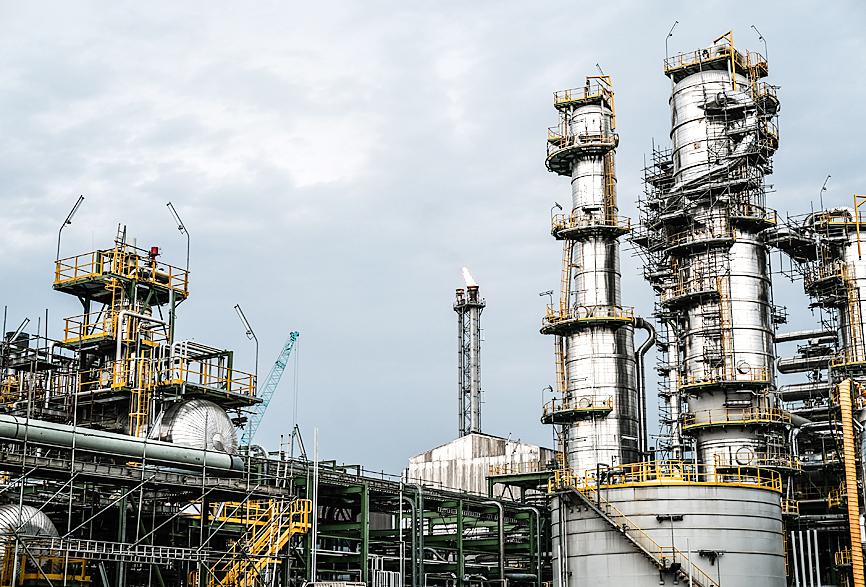Oil rose for a fourth week in a row as US Gulf Coast refineries began restarting, although gains were capped as investors shifted their focus from Hurricane Laura toward the fragile rebound in consumption amid the pandemic.
West Texas Intermediate for October Delivery was little changed on Friday, dropping 0.16 percent to US$42.93, and notched a 1.61 percent gain for the week.
Brent crude for October delivery gained 0.46 percent to US$45.81. It increased 3.29 percent for the week.

Photo: Bloomberg
While Laura was one of the most powerful hurricanes to ever hit Louisiana, facilities in southeast Texas avoided the worst of the storm, allowing infrastructure there to begin the recovery process.
Among those facing more extensive repairs, Citgo Petroleum Corp said that its refinery in Lake Charles, Louisiana, sustained damage from high winds and likely would not see an immediate restart.
Despite the hiccup in production, US gasoline stockpiles remain at their highest seasonal level in decades.
“Gasoline demand is still low, inventories are high” as the pandemic persists, said Michael Hiley, head of over-the-counter energy trading at New York-based LPS Futures. “So if there ever was a time where we could tolerate losing some refining capacity, it would be now.”
Refining margins for combined gasoline and diesel jumped 12 percent on Friday due to refinery closures in Southeast Texas and Louisiana because of Laura.
The pace of COVID-19 infections rose further in key European countries and German Chancellor Angela Merkel said that more sacrifices lie ahead after the summer.
“The focus seems to be more on the demand front than supply at this point,” said Josh Graves, senior market strategist at RJ O’Brien & Associates LLC.
In a sign that China’s thirst for oil imports is waning, the number of supertankers hauling crude to the country slid to its lowest level since late March, ship-tracking data compiled by Bloomberg showed.
The number of very large and extra-large crude carriers signaling China in the next three months dropped by two to 79 in the past week, compared with a seasonal average of about 88 tankers.
Meanwhile, the slowdown in demand is resulting in weaker margins for producing fuels, reducing the incentive for refiners to purchase more crude.
In Europe, profit from turning crude into diesel weakened to its narrowest since June on Thursday, while that for gasoline in the US was its lowest since April.
Additional reporting by staff writer

To many, Tatu City on the outskirts of Nairobi looks like a success. The first city entirely built by a private company to be operational in east Africa, with about 25,000 people living and working there, it accounts for about two-thirds of all foreign investment in Kenya. Its low-tax status has attracted more than 100 businesses including Heineken, coffee brand Dormans, and the biggest call-center and cold-chain transport firms in the region. However, to some local politicians, Tatu City has looked more like a target for extortion. A parade of governors have demanded land worth millions of dollars in exchange

Hong Kong authorities ramped up sales of the local dollar as the greenback’s slide threatened the foreign-exchange peg. The Hong Kong Monetary Authority (HKMA) sold a record HK$60.5 billion (US$7.8 billion) of the city’s currency, according to an alert sent on its Bloomberg page yesterday in Asia, after it tested the upper end of its trading band. That added to the HK$56.1 billion of sales versus the greenback since Friday. The rapid intervention signals efforts from the city’s authorities to limit the local currency’s moves within its HK$7.75 to HK$7.85 per US dollar trading band. Heavy sales of the local dollar by

Taiwan Semiconductor Manufacturing Co’s (TSMC, 台積電) revenue jumped 48 percent last month, underscoring how electronics firms scrambled to acquire essential components before global tariffs took effect. The main chipmaker for Apple Inc and Nvidia Corp reported monthly sales of NT$349.6 billion (US$11.6 billion). That compares with the average analysts’ estimate for a 38 percent rise in second-quarter revenue. US President Donald Trump’s trade war is prompting economists to retool GDP forecasts worldwide, casting doubt over the outlook for everything from iPhone demand to computing and datacenter construction. However, TSMC — a barometer for global tech spending given its central role in the

An Indonesian animated movie is smashing regional box office records and could be set for wider success as it prepares to open beyond the Southeast Asian archipelago’s silver screens. Jumbo — a film based on the adventures of main character, Don, a large orphaned Indonesian boy facing bullying at school — last month became the highest-grossing Southeast Asian animated film, raking in more than US$8 million. Released at the end of March to coincide with the Eid holidays after the Islamic fasting month of Ramadan, the movie has hit 8 million ticket sales, the third-highest in Indonesian cinema history, Film